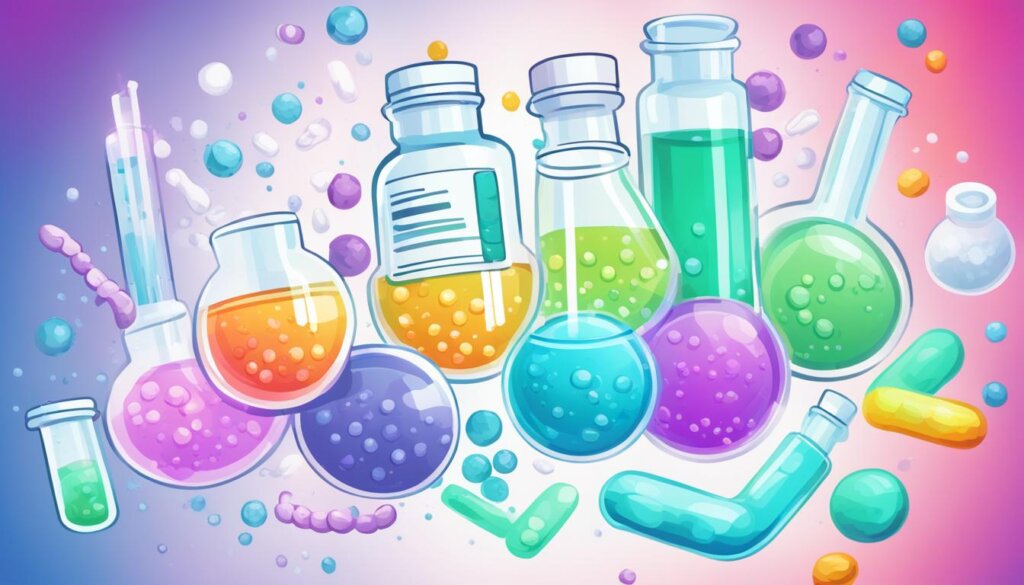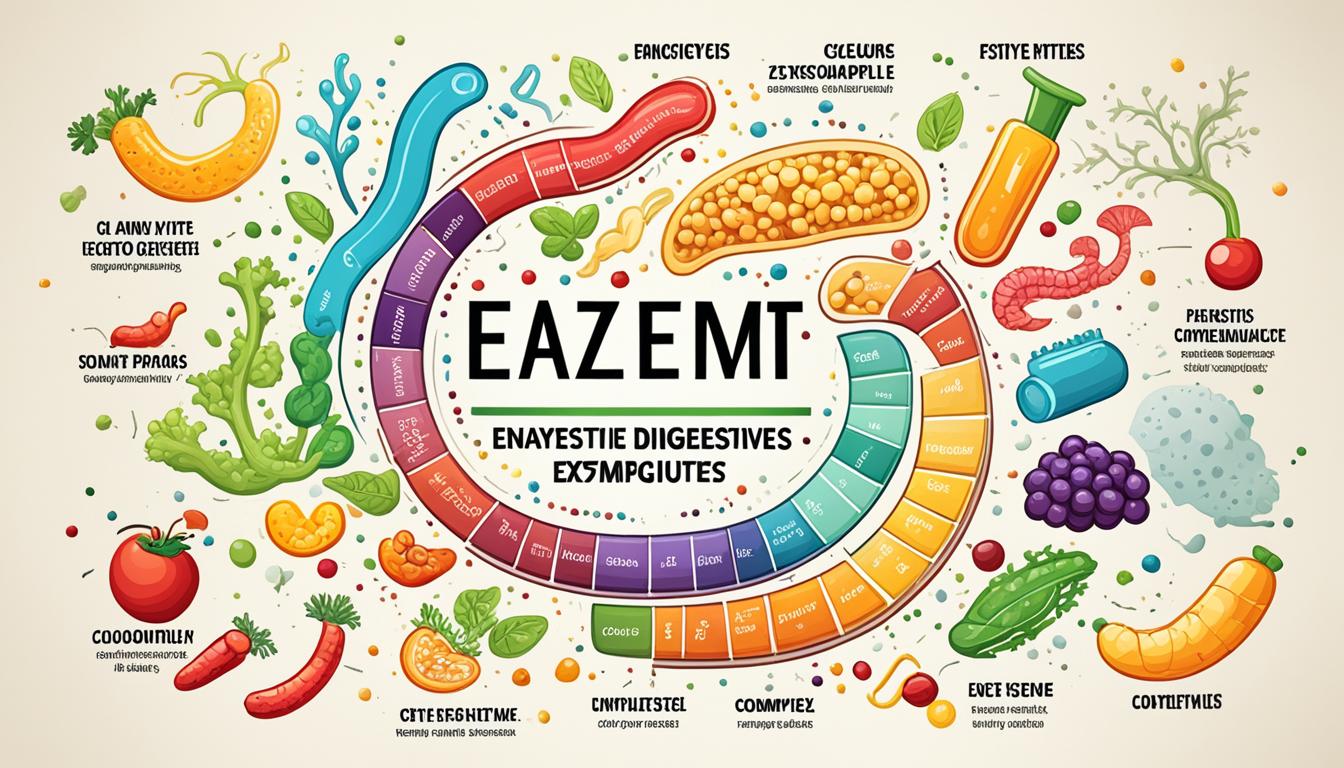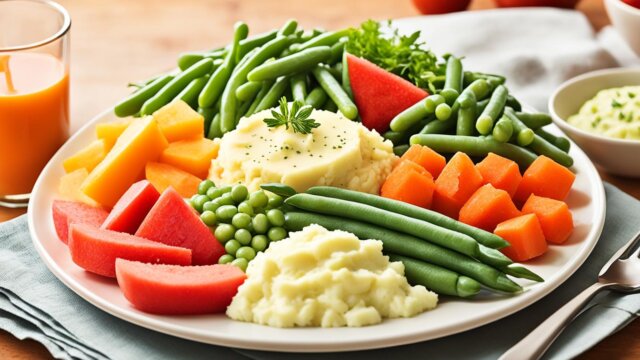FTC disclaimer: This post may contains affiliate links and we will be compensated if you click on a link and make a purchase.
Did you know the average person makes over 2,000 liters of digestive enzymes each year? These special proteins are key in breaking down food. They help us absorb the nutrients we need. And so, they keep our digestive system healthy.
The body makes different kinds of digestive enzymes like amylase, lipase, and more. Each one does a particular job in helping us digest food. It’s important to understand how these enzymes work to stay healthy.
- Digestive enzymes are essential proteins that break down food into absorbable nutrients
- Your body produces various types of digestive enzymes, each with a specific role in the digestive process
- Digestive enzymes are produced in the mouth, stomach, small intestine, and pancreas
- Enzyme deficiencies can lead to maldigestion, malabsorption, and other digestive issues
- Enzyme replacement therapy and dietary changes can help support optimal digestive health
Introduction to Digestive Enzymes
What are Digestive Enzymes?
Digestive enzymes are proteins made by our body help digest the food we eat. They break down what we eat into smaller bits the body can use.
These enzymes are super important for digesting carbs, fats, and proteins.
The Role of Digestive Enzymes in Digestion
Without them, our body wouldn’t get the nutrients it needs from food. This could lead to not getting enough vitamins and minerals, causing health problems.
The pancreas makes key digestive enzymes, such as amylase, lipase, and protease. These enzymes help break food down so we can absorb the nutrients.
Some supplements have more enzymes like lactase that help with some fiber types. Not making enough enzymes can be from genes, health conditions, or surgeries.
Signs of not enough enzymes can be stomach pain, gas, diarrhea, and more.
If someone isn’t making enough enzymes, doctors might suggest special enzymes to help. These can improve how well we get nutrients from food. But the extra enzymes you find in stores for things like gas are not checked by the FDA.
Eating a good diet with lots of fruits, veggies, lean meats, and grains can help our digestive enzymes work better.
Types of Digestive Enzymes
Digestive enzymes are key in breaking your food into smaller parts your body can use. Your body makes them to help in various ways during digestion. Knowing about these enzymes can help you understand your body better.
Amylase
Amylase breaks down starches into sugars. This process begins when you chew, as the salivary glands produce amylase. It continues in your stomach and helps a lot in the digestion process.
Lipase
Lipase helps digest fats with the help of liver bile. Your pancreas makes this enzyme. It ensures your body can digest and use the fats you eat.
Protease
Protease turns proteins into amino acids, which your body needs for growth and repair. It’s made in the stomach and helps your gut stay healthy by digesting proteins well.
Lactase
Lactase breaks down lactose, the sugar in dairy. Without enough lactase, dairy can cause discomfort like gas, bloating, and cramps. It’s a common problem known as lactose intolerance.
Cellulase
Cellulase takes care of fiber in plants, breaking down cellulose. Although our bodies don’t produce this enzyme, we can get it from certain foods and supplements. It helps digest plant-based fiber.
Maltase
Maltase breaks down maltose, a sugar, in the small intestine. It’s important for carb digestion.
Sucrase
Sucrase breaks down sucrose, or table sugar, in the small intestine. It’s crucial for carb digestion, like maltase.
Peptidase
Peptidase breaks down peptides, which are short chains of amino acids. It’s essential for the last step of protein digestion in the small intestine.
Nuclease
Nuclease handles nucleic acids, like DNA and RNA. It’s a less known enzyme but still important for breaking down certain nutrients in food.
Every digestive enzyme has a specific job to help your body use different parts of food. Learning about these enzymes shows how complex but well-designed our digestion is. This knowledge can lead to better digestive health.
Sources of Digestive Enzymes
Digestive enzymes come from the body and what we eat. They are made in the mouth, stomach, small intestine, and pancreas. The pancreas is very important. It makes key enzymes that break down carbs, proteins, and fats.
Enzymes Produced by the Body
The body makes these enzymes to absorb nutrients well. The pancreas makes amylase, lipase, and protease. These break down food. In the small intestine, we also have lactase and sucrase. They help with sugars like lactose and sucrose.
Dietary Sources of Digestive Enzymes
Some foods have natural enzymes that are good for digestion. This list includes avocados, bananas, ginger, honey, kefir, kiwi, mangos, papayas, pineapples, and sauerkraut. Eating these foods can boost your digestion.
Digestive Enzyme Insufficiency
Some folks might not have enough digestive enzymes. This is called digestive enzyme insufficiency. It can happen due to many things, like genetic problems or diseases such as chronic pancreatitis and diabetes.
Causes of Enzyme Deficiency
The main reasons behind enzyme deficiency are genetic issues and certain illnesses. Illnesses like chronic pancreatitis and cystic fibrosis change how the body makes digestive enzymes.
Symptoms of Enzyme Deficiency
If you lack enough enzymes, you might feel bloated or gassy. You could have stomach cramps after eating, get diarrhea, or see yellow, greasy stools. You might even lose weight without trying.
Not having the right enzymes can cause problems digesting and absorbing food. This can lead to serious issues like malnutrition if not treated.
Low amylase can make you have diarrhea. Less lipase means you might not get enough vitamins A, D, E, and K. A lack of protease could cause allergic reactions or harm your intestines.
It’s important to deal with enzyme shortages to keep your digestion healthy. This can help avoid bigger health problems.
Enzyme | Function | Deficiency Symptoms |
|---|---|---|
Amylase | Breaks down carbohydrates | Diarrhea |
Lipase | Breaks down fats | Deficiency of fat-soluble vitamins A, D, E, and K |
Protease | Breaks down proteins | Allergies, intestinal toxicity |
If you know what causes and signs of enzyme issues, you can do something about it. This can make your gut health better.
Enzyme Replacement Therapy
If someone lacks digestive enzymes, their doctor might suggest enzyme replacement therapy. This involves taking enzyme pills called pancreatic enzyme replacement therapy (PERT). These pills have amylase, lipase, and protease. They help with digesting carbs, fats, and proteins. Normally, these pills are from pig pancreas and are FDA-approved.
Prescription Enzyme Supplements
PERT is a prescription therapy. It contains pancrelipase, which has amylase, lipase, and protease. Doctors adjust the dose based on how much the patient weighs and how they eat, starting with a small dose. Most people with cystic fibrosis who have low pancreatic enzyme levels get help from PERT.
Over-the-Counter Enzyme Supplements
You can find enzyme supplements without a prescription too. These are not as closely regulated. They might have different ingredients and doses than prescription ones. Animal or plant sources, like molds and yeasts, can be used to make these supplements.
The FDA does not watch over these, meaning what you get may vary in how well it works. Common enzymes found in these supplements are amylase, lipase, and others that help with digestion.
Taking too many digestive enzymes can cause some not-so-fun side effects like constipation or diarrhea. A lack of these enzymes might be because of genes or certain health problems. Problems such as chronic pancreatitis, cystic fibrosis, or surgeries can lead to this.
Signs that you might not have enough enzymes are stomach pain, feeling bloated, or diarrhea. If these issues keep happening, it’s smart to see a doctor.

Enzyme Supplements and Digestive Health
Enzyme supplements can really boost your digestive health. If your body lacks enzymes, taking these can be very helpful. They make sure you absorb nutrients well, avoid issues like bloating, gas, and diarrhea.
Yet, they may lead to some side effects, such as constipation, nausea, and stomach cramps. Always speak with a doctor before starting them and keep an eye on any new symptoms.
Benefits of Enzyme Supplementation
Looking into enzyme supplements for your digestion is a great idea. They help break down food and soak up nutrients. This can stop you from having issues like acid reflux or feeling bloated. Some might be extra useful for people with celiac disease, reacting to gluten.
Potential Side Effects
But, these supplements might not always sit well with everyone. You could feel constipated or have an upset stomach. Pregnant women and those nursing need to be extra cautious, especially with certain enzyme types, like lipase. They’re also not fully studied in kids. Keep watch for any bad signs, and contact a doctor if you’re worried.
Choosing enzyme supplements wisely is key, since they’re not as checked as medicines. Always talk with a pro to find the right kind and amount for your health needs.
Dietary Considerations for Optimal Digestion
It’s not just about enzymes, changing what you eat helps digestion too. Focus on whole, unprocessed foods. These include fruits, vegetables, lean proteins, and whole grains. These foods help your body make good use of its digestive enzymes. But, stay away from processed, fatty, and fried foods. They are tough on your stomach and can cause problems. A well-balanced diet keeps your digestion and nutrient intake in check.
Add more enzyme-rich whole foods to your diet. Foods like avocados, bananas, ginger, honey, kefir, kiwi, mangos, papayas, pineapples, and sauerkraut are great. These foods boost your digestive enzymes and help your body handle carbohydrates, fats, and proteins. Choosing these foods means better digestion and nutrient use.

Whole, Unprocessed Foods | Processed and Fried Foods |
|---|---|
Fruits, vegetables, lean proteins, whole grains | Highly processed, fatty, and fried items |
Support the body’s natural digestive enzymes | Can be harder to digest and contribute to digestive issues |
Promote healthy digestion and nutrient absorption | May lead to maldigestion and malabsorption |
Think about what you eat and focus on whole, unprocessed foods. This supports your natural digestive enzymes and improves your digestive health. Remember, a good diet and smart food choices can help a lot. They make sure your body gets all the nutrients it needs.
Digestive Enzymes and Specific Conditions
Some health issues are connected to not having enough digestive enzymes. For instance, not having enough lactase can cause lactose intolerance. This means the body can’t break down the sugar in dairy. So, people may feel bloated, gassy, or have diarrhea when they eat dairy.
Lactose Intolerance
Many people, about 65%, become lactose intolerant as they grow older. Some can get it from diseases like celiac or Crohn’s. If you are lactose intolerant, you might need to stay away from dairy or use lactase pills. This can help you feel better.
Exocrine Pancreatic Insufficiency (EPI)
Exocrine Pancreatic Insufficiency (EPI) happens when the pancreas doesn’t make enough enzymes. This can make it hard for the body to digest food and get nutrients. People with EPI are missing important enzymes like amylase and lipase.
Signs of this problem include gas, bloat, diarrhea, and losing weight without trying. To help with EPI, doctors might suggest taking digestive enzymes or changing your diet.
Knowing about digestive enzymes helps us take better care of our guts. By dealing with these enzyme issues, we can absorb more nutrients. We can also make life easier for people with lactose intolerance or EPI.
Conclusion
Digestive enzymes are key in breaking down and absorbing nutrients from food. It’s important to know about the different types of digestive enzymes. Their roles and the signs of low enzymes help keep our digestive health in check.
Enzyme replacement therapy and enzyme supplements help people with digestive issues. Also, eating foods high in enzymes and staying away from processed foods aids digestion naturally.
Improving how your body uses nutrients can boost your health. A good diet and, if needed, adding extra enzymes can make your digestive system work better. This combo supports a strong, working digestive system.
FAQ
What are the main types of digestive enzymes?
What is the role of digestive enzymes in the body?
Where are digestive enzymes produced in the body?
What are the sources of digestive enzymes?
What is digestive enzyme insufficiency?
How can digestive enzyme deficiencies be treated?
What are the benefits of enzyme supplementation?
How can diet affect digestive enzyme function?
Source Links
- https://www.webmd.com/diet/what-are-digestive-enzymes
- https://www.hopkinsmedicine.org/health/wellness-and-prevention/digestive-enzymes-and-digestive-enzyme-supplements
- https://www.verywellhealth.com/what-are-digestive-enzymes-1945036
- https://www.medicalnewstoday.com/articles/digestive-enzymes
- https://www.healthline.com/health/exocrine-pancreatic-insufficiency/the-role-of-digestive-enzymes-in-gi-disorders
- https://www.health.com/condition/digestive-health/digestive-enzymes
- https://www.healthline.com/health/why-are-enzymes-important








